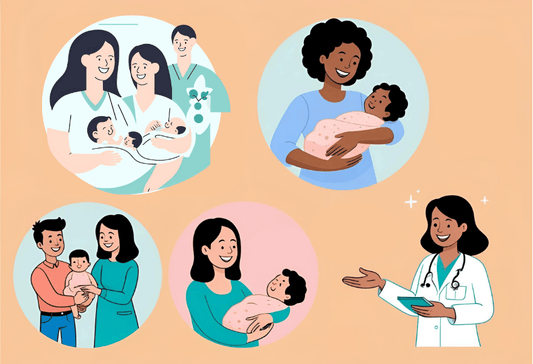March 24, 2025 | Pregnancy
Tips to Get Pregnant: A Comprehensive Guide

Many individuals and couples embark on this journey with hope and excitement. While conception can sometimes take time, understanding the factors that influence fertility can improve your chances. This guide covers essential tips to get pregnant, from timing intercourse to lifestyle changes and medical support.
-
Understand Your Menstrual Cycle
One of the most crucial steps in getting pregnant is knowing when you ovulate. Ovulation occurs when your body releases an egg, making it the most fertile time in your cycle. Here’s how to track it:
Ovulation predictor kits (OPKs): These test strips detect the luteinizing hormone (LH) surge, which occurs 24-36 hours before ovulation. Shop an OPK
Basal body temperature (BBT): A slight temperature rise signals ovulation has occurred. Shop a BBT
Cervical mucus changes: Fertile mucus is clear, stretchy, and egg white-like. This product helps improve cervical mucus, check it out
Menstrual cycle tracking: Ovulation usually happens around 14 days before your next period.
-
Time Intercourse / Insemination Around Ovulation
To maximize your chances of conception:
Have sex or inseminate every two to three days throughout your cycle.
Increase frequency (of insemination or sex) during your fertile window (approximately five days before and one day after ovulation).
Avoid lubricants that may impact sperm motility unless they are fertility-friendly. Checkout our fertility friendly lubricants here
-
Maintain a Healthy Lifestyle
Your overall health plays a significant role in fertility. Consider the following:
Eat a balanced diet: Focus on whole foods, lean proteins, healthy fats, and fertility-boosting nutrients like folate, zinc, and omega-3s.
Exercise in moderation: Excessive exercise can disrupt ovulation, while moderate activity supports overall reproductive health.
Manage stress: Chronic stress may affect hormonal balance. Try meditation, yoga, or mindfulness practices.
Limit caffeine and alcohol: Too much caffeine and alcohol may lower fertility rates.
Here’s a dedicated learning piece that talks about lifestyle choices for couples/individuals looking to conceive - Lifestyle choices for couples looking to conceive
-
Get a Preconception Check-Up
If you've been actively trying and haven't seen the smiley face yet consider scheduling an appointment with your healthcare provider. They can:
Review your medical history.
Recommend prenatal vitamins, particularly those containing folic acid.
Address underlying health conditions such as PCOS, thyroid issues, or endometriosis.
Discuss any necessary vaccinations.
-
Consider Fertility Supplements
Certain vitamins and supplements can support reproductive health, including:
Folic acid: Essential for early fetal development.
Vitamin D: May improve ovarian function.
CoQ10: Supports egg and sperm quality.
Myo-inositol: Can help regulate cycles, especially for those with PCOS.
Great news! The Amitamin Fertil F Phase 1 contains everything mentioned above!
-
Understand the Impact of Age on Fertility
Fertility declines with age, especially after 35. While many conceive naturally later in life, it may take longer. If you've been trying for over a year (under 35) or six months (over 35), consult a fertility specialist.
-
Address Male Fertility Too
Sperm health is just as important. Men can boost fertility by:
Eating a nutrient-rich diet.
Reducing stress and avoiding excessive heat (e.g., hot tubs, laptops on laps).
Maintaining a healthy weight.
Avoiding smoking, excessive alcohol, and recreational drugs.
Here’s a dedicated learning piece that talks about male fertility - Importance of sperm quality and its impact on fertilization potential
If conception is taking longer than expected, medical options such as hormone treatments, assisted reproductive technologies (ART), or intrauterine insemination (IUI) may help. Consulting a fertility specialist can provide clarity on your next steps.
If you need help going through any block, talking with a TTC consultant can help! Book a FREE 15 minute virtual consult today!
Featured Product

Hapū Helpers
OvaDetect Ovulation Strips - Quality easy-use-at-home strips








